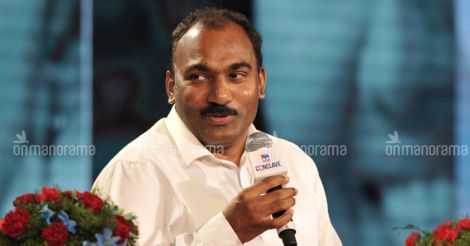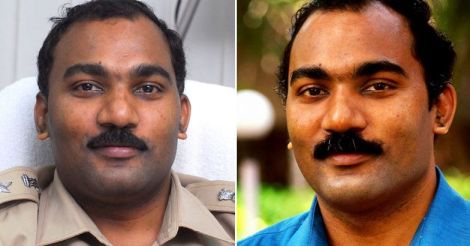Year 1973. A boy was born to Karuppayya and Subbamal who worked as tea-leaf pluckers in Cholama near Munnar. Karuppaya, who was employed at the Tata Tea plantations (now Kannan Devan Hills Plantation Company Limited) was a fourth standard dropout while Subbamal was illiterate.
The boy, named Sethuraman by his parents, grew up in a two-room tenement (layam) provided by the employer. At the age of five, just like any other kid in the locality, he joined the single-teacher school in Cholamala. The Tamil medium school had only two class rooms, and as all the students sat together, no textbooks were used to teach them. The only class room material available was a slate and pencil.
The boy studied there for two years. Karuppayya enrolled him in another school in Periyavare after the teacher informed him that the boy had passed second standard. There too the classes were conducted in Tamil. After completing fourth standard, he joined Little Flower Girls High School in Munnar where boys were allowed to study only up to fifth standard. The teachers there prodded him to give the Sainik School entrance examination a try. He cleared the test and joined Standard VI in Sainik School, Amaravathinagar, in Udumalpet.
Year 2012. The name board adorning the office of the Malappuram District Superintendent of Police read: ‘K. Sethuraman IPS’. He was at the helm of the district’s police department for more than three years, but the people of Malappuram did not want him to be transferred. During his term in office, Sethuraman published a research study which laid emphasis on protecting and preserving Indian languages.
The journey of his life - from a shanty in Munnar to the corridors of power, is a lesson for each one of us.
It was not easy, says Sethuraman, recalling his journey. “I got myself a more realistic world-view and set goals for life only after joining the Sainik School. The teachers there were good at infusing a sense of purpose into the students. When I completed sixth standard, M. S. Hooda, the principal, gave me confidence to believe in myself, telling me that I had the talent to crack the civil services examination. To me, it appeared to be an over-ambitious dream, but he was planting the seeds for the future in my mind. It was up to me to protect it from wilting and dying. Fighting many odds, I tried my best to keep that goal in mind and achieve it successfully.
English was the medium of instruction in the Sainik School. It was a huge challenge for somebody who struggled to read and write Malayalam or Tamil properly! The first three years were very tough. However, my teachers were always there to guide me.

Seventh time lucky
Sethuraman appeared for the civil services examination seven times. The first and second attempts were made while he was doing his MA and M.Phil respectively. On both occasions, he cleared the preliminary exam, but faltered at the main exam.
His third shot at the examination was during the second year of his M.Phil course, in which he failed to go past even the preliminary round. In 2001, he cleared both preliminary and main examinations for the first time, but could not overcome the hurdle of interview. In 2002, he once again passed the prelims but failed in the main exam. Finally, in 2003, he achieved the decade-long dream by securing the 322rd all-India rank and 23rd rank in the scheduled caste category.
The turning point
The decision I took when I was confused about the selection of a suitable degree course was the turning point in my life. Though I had scored good marks in Plus Two science stream, there was an inner calling to pursue an economics degree. I believed that I could use it as a resource for preparing for the civil services exam.
However, I was forced to disregard the inner voice due to circumstantial pressures and joined BSc Chemistry at Mar Ivanios College in Thiruvananthapuram. It did not take me very long time to realize that it was not my calling. Eventually, I discontinued the course before the first year examination!
I could have done a degree in Economics at the same college next year. But I decided to join another college to avoid being a junior to my BSc classmates. That’s how ended up at University College. During that period, strikes and agitations were daily affairs in the college. The atmosphere was not conducive for conducting regular classes. The only way out was self-learning. In fact, it has helped me a lot in the later stages of life. I did my masters in Economics from the same college as well.
Thereafter, I registered for M.Phil at the Centre for Development Studies. The topic I chose was ‘The role of tribal people in People’s Plan campaign’. In the meantime, I attempted Civil Services examination several times without success. It was during that period I had a feeling that Civil Services was not the end of the world. I was guided by the motto that acquiring knowledge was the most important thing in one’s life.
I spent most of my time at the Public Library, British Library, IMG Library and the University Library in the capital city. The next one-and-a half years saw me undergoing coaching at the Institute for Civil Services Examination Training Society in PTP Nagar. In the meantime, he supported himself by teaching Indian Economy at a private coaching center in Thiruvananthapuram for about two years and at the PC Thomas Institute in Thrissur for about three months. That experience was of great help. I also had the opportunity to join a circle of civil services aspirants and attend group discussions.
Poor handwriting
During that period, it dawned on Sethuraman that his poor handwriting was hampering his chances in the exam. He worked hard to overcome that one drawback, but his finger refused to obey him. It was then he chanced upon a news article about the National Handwriting Academy in Hyderabad. Keeping those rules mentioned in the write-up in mind, he practiced hard for days to make his scruffy handwriting more readable. His efforts finally bore fruit.
Dreams and struggles
While in college, his classmates used to say that Sethuraman was obsessed with civil services as he had nothing else to talk about. Cracking the exam was his ultimate goal.
There were periods of pain and uneasy experiences throughout his journey to the pinnacle bureaucratic hierarchy. His father had to struggle hard to fund his studies. As he did not want to trouble his poor father further, Sethuraman decided to get an educational loan. He approached three major banks to obtain the loan. But a plantation worker’s son seeking loan to pursue civil services was enough reason for them to turn him away. A professional course could have easily fetched him a loan. He had no idea how he would manage to get the money as the family had no land in its possession to mortgage.
However, he completed the studies with the help of some large-hearted persons. Sethuraman also took up part-time teaching jobs at Brilliant College and the PC Thomas Institute to fund his studies. He used to earn Rs 500 a day at that time. It was a decent amount then, Sethuraman says.
As he found it difficult to concentrate on studies, Sethuraman shifted from the hostel and started staying as a paying guest at his teacher Nanu Pilla master’s house in Jawahar Nagar. He was very protective and helpful, says the IPS officer.
The final hurdle
I had become an ‘experienced exam writer’ when I gave civil services another shot in 2013. I was brimming with confidence like never before. Though I could clear both prelims and main exams with ease in 2001, anxiety and nervousness ruined my opportunity to clear the interview that year. The interview board asked me to name the chief ministers of Chhattisgarh and Uttarakhand. Though I knew it was Ajit Jogi and Nityanand Swami respectively, I could not answer them correctly as I got panicked and overawed by the occasion.
However, in 2013, Sethuraman was determined to face the interview with confidence and courage. Luckily, he could control the senses perfectly and perform well. Sethuraman was the individual athletics champion at University College that year by winning 800m, 1,500m, and 5,000m races. He had also been a regular winner at school-level cross-country competitions. The interview board asked him why didn’t he opt to compete in sprint events, Sethuraman’s replied that his physique best suited for middle-distance running.
The other questions were from economics. The board asked him questions such as the reason for the Reserve Bank to effect a cut in the interest rate, and the potential impacts of the World Trade Organization (WTO) agreements on developing countries. When asked about the growing presence of nurses from Kerala around the globe, he attributed it to the state’s high female literacy rate and women empowerment initiatives as well as the nobility attached to the profession.
Smart work not hard work
• The key thing is selecting a good school and college. Academic institutions have a pivotal role in inculcating a positive vision and attitude in students. I’m not talking about schools and colleges that turn students into marks-producing machines. Choose schools that will help children be better individuals.
• Make it a habit to prepare notes and keep them for quick revision. Start doing this from a young age. Teachers should encourage students to develop this habit.
• It is advisable to read an English and Malayalam newspaper every day. Reading a vernacular daily is important to have an idea of things happening around you. Do read write-ups on subjects you have no interest in.
• Pay attention to different perceptions on different subjects and shape your own understanding of concepts. Newspapers, magazines, and channel debates will be of great help to shape your vision.
• Be part of a circle of like-minded people to gain knowledge through combined study. Group discussions will help you get an insight into new topics. Apart from helping you be academically successful, such companionship will also boost your confidence.
• Instead of reading everything that comes your way, make a list of important books. It is not a good idea to read everything because time is very precious.
• The will to rise above poverty can bring out the best in a person. Remember, not everybody is born to wealth. There are successful people who, through determination and tenacity, withered hardships to reach their goals against all odds.
• Motivating yourself and telling yourself ‘I can do better’ really helps. Prepare for examinations and interviews with a passion to achieve. Your greatest strength is nothing but your confidence.
• Appear for an exam after preparing well to give yourself the best chance of winning it, rather than exhausting the available attempts by merely attending the test. Practicing previous years' question papers is one of the key steps. If you feel you can do it, go and give it your best shot.
• It is ‘smart work’ not ‘hard work’ which holds the key to cracking civil services examination.
Read: Latest Kerala news | #GougeDa: Blindfolded Alencier files complaint against woman BJP leader

























 The journey of Sethuraman IPS - from a shanty in Munnar to the corridors of power, is a lesson for each one of us.
The journey of Sethuraman IPS - from a shanty in Munnar to the corridors of power, is a lesson for each one of us.